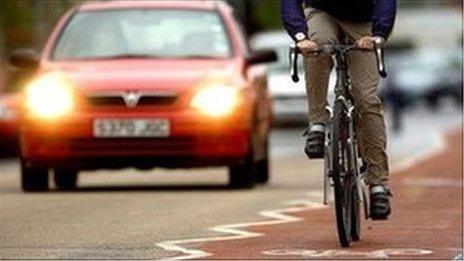Scotland's road casualty figures at record low
- Published

The figures showed a rise of 6% in the number of cyclists involved in accidents
The number of people killed or injured on Scotland's roads has fallen to the lowest level since records began.
Provisional results from Transport Scotland for 2011 suggested there had been an 11% drop in road deaths and a 4% decrease in casualties.
However, the figures also showed there were 824 incidents involving cyclists, a rise of 6% on the previous 12 months.
There were a total of 12,763 injuries and deaths on the roads in 2011, 575 fewer than in 2010.
Of those, deaths were down by 22 to 186 and injuries decreased by 553 to 12,577.
There were 1,315 child casualties, 63 fewer than in 2010. The number includes seven fatalities, five of which were car passengers.
Transport Minister Keith Brown said: "We in the Scottish government are very aware of the tragic and personal cost of every fatality on our roads.
"I am therefore encouraged by the very latest data which shows total reported road casualties are now at their lowest level since records began."
Despite the overall reduction, more pedestrians and cyclists were injured on the road in Scotland.
Advertising campaign
The figures showed that seven cyclist were killed, the same number as the previous year.
At the same time, pedestrian casualties increased by 2% to 2,057 but there were four fewer deaths.
Mr Brown said: "Earlier this year I convened a special meeting of the road safety group to focus on cycle safety and we have launched our first-ever TV advertising campaign, Give Me Cycle Space, aimed at encouraging drivers to look out for cyclists.
"Bikeability Scotland will also give every school child the opportunity for on-road cycle training and we are working closely with cycling organisations and lobby groups to increase and improve bike use in Scotland.
"There is also a key role for local authorities in investing in 20mph zones and cycling facilities.
"We do not wish to see repeats of the recent accidents involving cyclists and our collective efforts must be redoubled to make cycling a safe travel option."
Assistant chief constable Tom Ewing, secretary of the Association of Chief Police Officers in Scotland's road policing team, said more must be done to improve the figures.
He said: "The results from this year's summer drink-drug drive campaign show that many drivers still think it is acceptable to put their lives and the lives of others at risk by driving under the influence of drink or drugs.
"Tackling drink and drug driving along with other driving offences remains a high priority for the Scottish police service and we will continue to work closely with our road safety partners to tackle these important issues and make Scotland's roads safer."
- Published7 March 2012
- Published5 March 2012